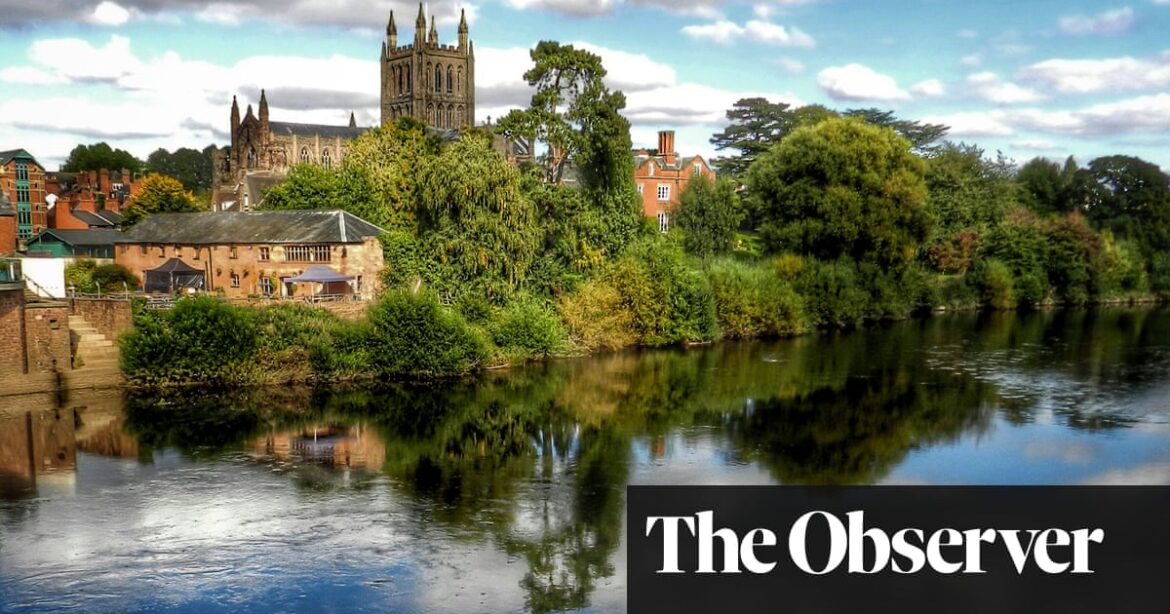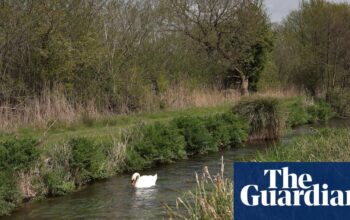
The Environment Agency is being accused of neglecting the River Wye once again, as a conservation group’s investigation uncovered the discharge of pollutants and contaminated water from free-range egg farms into the surrounding waterways within the catchment area.
19 out of 47 sites observed in England and Wales within the Wye catchment had drains that connected poultry units to a nearby waterway. A significant number of these farms had drains dug within close proximity to the sheds.
Charles Watson, the chairman of River Action, a non-profit organization that used freedom of information laws to acquire information on advisory visits to free-range egg farms, stated that the documents reveal that many intensive egg farms are releasing the waste of hundreds of thousands of chickens directly into the river system without implementing proper measures to mitigate the impact.
“This action blatantly violates regulations, and the organizations responsible for safeguarding the environment have largely ignored it. There has been appalling negligence for an extended period of time.”
The River Wye has been negatively affected by contamination from poultry farming, as numerous new facilities have been authorized in the past twenty years to meet the high demand for poultry products. In May of last year, concerns were raised by activists about the damaging effects of intense poultry production on the River Wye’s ecosystem, resulting in its classification being lowered.
The Wye and Usk Foundation, an organization dedicated to enhancing the environment of the River Wye, carried out advisory trips to various farms. These visits were done in collaboration with free-range egg farmers, some of whom are suppliers for Noble Foods, the parent company of the Happy Egg Company brand.
Last February, the Wye and Usk Foundation sent an email to officials from the Environment Agency stating that water from farm drainage posed a pollution threat and should not be released into waterways. The foundation also expressed that this is a widespread issue that has been challenging to resolve.
The charity needed advice on how to handle the disposal of excess water. The Wye and Usk Foundation is collaborating with farmers to enhance the protection of the River Wye catchment from waste and runoff from farming activities.
Simon Evans, the CEO of the Wye and Usk Foundation, stated that their organization collaborates with farmers and the supply chain in order to address the issues affecting our rivers. Some of these challenges are a result of past inadequate planning decisions, particularly when development has been permitted too close to waterways. In certain instances, finding solutions is not straightforward and requires careful evaluation and guidance from regulatory bodies. Noble has been actively involved in identifying and financing solutions on the farms that supply them, and their assistance has been instrumental in driving progress towards resolving these problems.
River Action is pursuing a legal review against the Environment Agency for purportedly neglecting to safeguard the River Wye against agricultural contamination. It is alleged that the agency has not effectively regulated the distribution of excessive organic manure or enforced the regulations appropriately.
Ricardo Gama, a lawyer from the firm Leigh Day, is serving as legal representation for River Action in the upcoming high court judicial review in Cardiff. According to Gama, River Action’s main objective is for the agency to take a firm stance and actively enforce the regulations.
A representative from the Environment Agency stated that they acknowledge the challenges facing the River Wye and are taking action by providing various forms of assistance to farmers along the river in order to facilitate their shift towards more eco-friendly methods. They also collaborate with organizations such as the Wye and Usk Foundation, which offers guidance to farmers.
“We conducted 493 farm inspections and issued 285 improvement notices within the Wye River area between April 1 and December 31, 2023. These inspections focused on key regions such as protected habitats, and areas where there were indications of rule violations and pollution.”
A representative from Noble Foods stated that they have been diligently collaborating with their producers in the Wye and Usk region for the past three years. The company sources from family-owned farms in the area, which make up less than 5% of the overall poultry population in the region. Furthermore, they are promoting the implementation of nature-based solutions, like wetland pools, through their partnership with the Wye & Usk Foundation.
Gary Ford, the head of the British Egg Industry Council (BEIC), stated that the BEIC is dedicated to following all legal obligations and ensuring that egg production does not have a negative impact on the surrounding environmental systems.
The BEIC is providing financial support for various individual research studies in this particular field. The early findings indicate that free-range farming is unlikely to have a significant impact on the rise of phosphate levels in the Rivers Wye and Usk.
Rhian Jardine, the leader of development planning at Natural Resources Wales, stated that Welsh Water has released data showing that the use of rural land is responsible for 72% of the phosphorus pollution in the upper Wye. The organization will utilize all available resources to prevent pollution, but acknowledges that a collaborative effort is necessary for lasting solutions. Every individual has a role to play in this issue.
Source: theguardian.com



